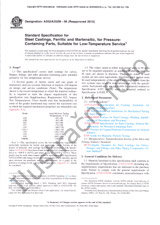Potřebujeme váš souhlas k využití jednotlivých dat, aby se vám mimo jiné mohly ukazovat informace týkající se vašich zájmů. Souhlas udělíte kliknutím na tlačítko „OK“.
ASTM D7278-21
Standard Guide for Prediction of Analyzer Sample System Lag Times
Přeložit název
NORMA vydána dne 1.12.2021
Informace o normě:
Označení normy: ASTM D7278-21
Datum vydání normy: 1.12.2021
Kód zboží: NS-1046316
Počet stran: 9
Přibližná hmotnost: 27 g (0.06 liber)
Země: Americká technická norma
Kategorie: Technické normy ASTM
Kategorie - podobné normy:
Anotace textu normy ASTM D7278-21 :
Keywords:
analyzer, lag time, on-line, sample systems, sampling, response,, ICS Number Code 17.220.01 (Electricity. Magnetism. General aspects)
Doplňující informace
| Significance and Use | ||||
|
5.1?The analyzer sample system lag time estimated by this guide can be used in conjunction with the analyzer output to aid in optimizing control of blender facilities or process units. A known and constant lag time is key for the use in optimizing control. 5.2?The lag time can be used in the tuning of control programs to set the proper optimization frequency. 5.3?The application of this guide is not for the design of a sample system but to help understand the design and to estimate the performance of existing sample systems. Additional detailed information can be found in the references provided in the section entitled Additional Reading Material. |
||||
| 1. Scope | ||||
|
1.1?This guide covers the application of routine calculations to estimate sample system lag time, in seconds, for gas, liquid, and mixed phase systems. 1.2?This guide considers the sources of lag time from the process sample tap, tap conditioning, sample transport, pre-analysis conditioning and analysis. 1.3?Lag times are estimated based on a prediction of flow characteristics, turbulent, non turbulent, or laminar, and the corresponding purge requirements. 1.4?Mixed phase systems prevent reliable representative sampling so system lag times should not be used to predict sample representation of a mixed phase stream. 1.5?The values stated in inch-pound units are to be regarded as standard. Other units of measurement are included in this standard and Appendix X1 examples where normally seen in industry. 1.6?This standard does not purport to address all of the safety concerns, if any, associated with its use. It is the responsibility of the user of this standard to establish appropriate safety, health, and environmental practices and determine the applicability of regulatory limitations prior to use. 1.7?This international standard was developed in accordance with internationally recognized principles on standardization established in the Decision on Principles for the Development of International Standards, Guides and Recommendations issued by the World Trade Organization Technical Barriers to Trade (TBT) Committee. |
||||
| 2. Referenced Documents | ||||
|
Doporučujeme:
Aktualizace technických norem
Chcete mít jistotu, že používáte pouze platné technické normy?
Nabízíme Vám řešení, které Vám zajistí měsíční přehled o aktuálnosti norem, které používáte.
Chcete vědět více informací? Podívejte se na tuto stránku.




 Cookies
Cookies
